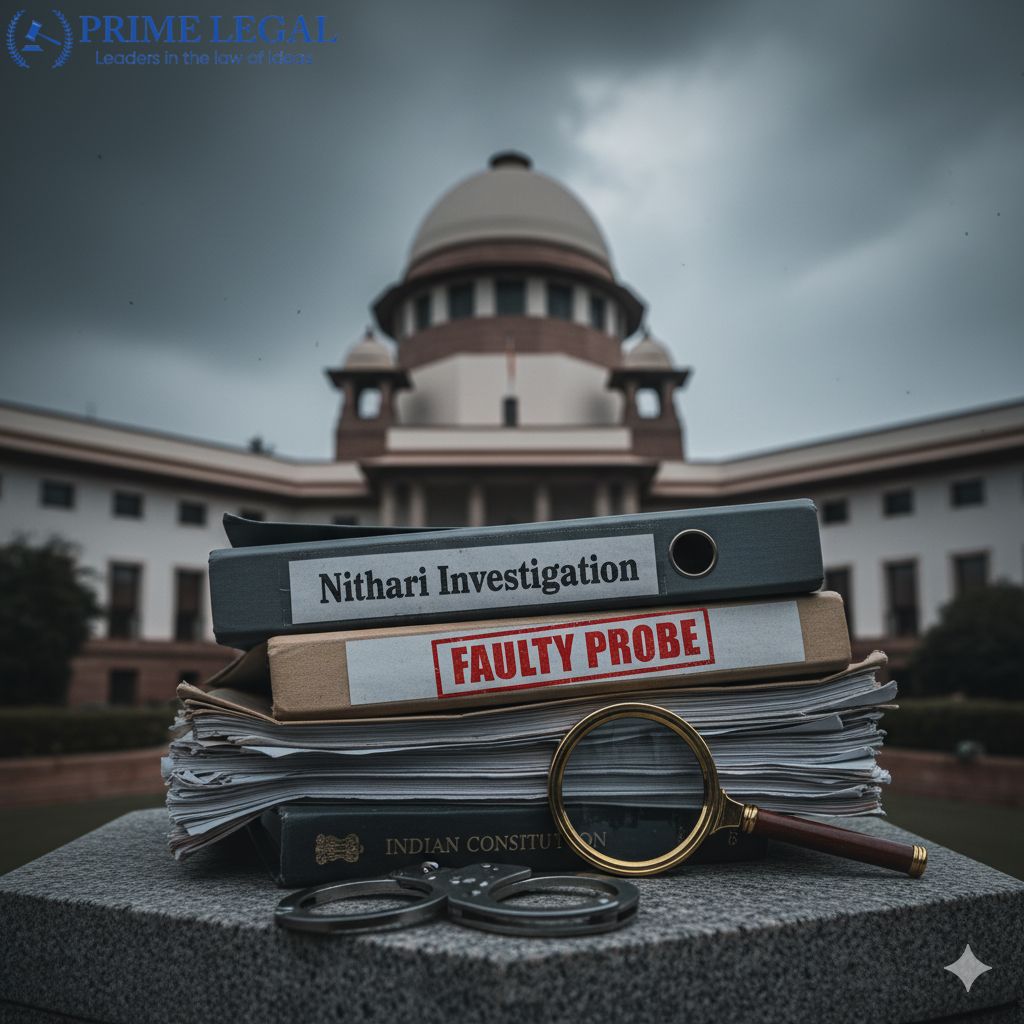INTRODUCTION
The recent Supreme Court’s judgment passed on 11 November 2025 has sparked public outcry, debate and controversy as two decades after the Nithari killings shocked the very conscience of the nation, the Supreme Court has set aside Surendar Koli’s last conviction, holding that the criminal justice system cannot convict a person on the basis of conjecture or suspicion, however grave the crime may be. In Surendra Koli v. The State of Uttar Pradesh & Anr, Diary No. 49297 of 2025, three judge bench of Chief Justice B.R. Gavai, Justice Surya Kant, Justice Vikram Nath passed a judgement allowing the curative petition filed by Surendra Koli and set aside his conviction in the last pending case related to the Nithari killings.
BACKGROUND
Briefly, the origin of the instant case can be traced back to the following facts: Surendra Koli, the petitioner herein, was a domestic helper at House D5, Sector 31, Noida owned by one Moninder Singh Pandher. From early 2005 residents of Nithari began reporting that women and children were missing. The discovery of human remains near the house of Moninder Singh, exposed one of the most gruesome crime stories in recent Indian history. The investigation led to the arrest of businessman Moninder Singh Pandher and his domestic help Surendra Koli, who were accused of abducting, sexually assaulting, and murdering several children and women. The investigation eventually resulted in thirteen trials. Koli was convicted and sentenced to death in 2011, a verdict that was later affirmed by the Supreme Court. However, in 2023, the Allahabad High Court acquitted both Pandher and Koli in twelve other Nithari cases, holding that the prosecution evidence was unreliable. The Supreme Court, in July 2025, dismissed the State’s appeals against those acquittals. Following that, Koli filed a curative petition against the 2011 Supreme Court judgment which affirmed his conviction in the other case.
KEY POINTS
- The Petitioner has approached the Supreme Court by way of Curative petition and has shown grounds that lie within the narrow compass of the curative jurisdiction recognised in its landmark judgment of Rupa Ashok Hurra v. Ashok Hurra, (2002) 4 SCC 388. Article 145 of the Constitution of India authorises the framing of rules and reiterates that this power flows from the inherent authority of this Court to do complete justice and to protect the integrity of its judgments. It may be invoked only after review has failed to correct a grave defect.
- It was observed by the Court that defects that existed in the investigation were not merely confined to factual peculiarities but they were structural infirmities inherent in the mode of proof relied upon. The petitioner’s Section 164 CrPC statement was recorded after about sixty days of uninterrupted police custody without meaningful legal aid and this compromised the environment of voluntariness, rendering the confession inadmissible as a matter of law. There was no principled basis on which the same statement can be treated as voluntary and reliable.
- Further it was pointed out that the scene was not secured before excavation began, the alleged disclosure was not contemporaneously recorded, the remand papers carried contradictory versions, crucial scientific opportunities were lost when post-mortem material and other forensic outputs were not promptly and properly brought on record The investigation did not adequately examine obvious witnesses from the household and neighbourhood and did not pursue material leads, including the organ-trade angle flagged by a governmental committee. Each lapse weakened the provenance and reliability of the evidence and narrowed the path to the truth. These gaps were central to the acquittals in the twelve cases. They are equally present here.This cumulatively has undermined confidence in the prosecution’s case theory.
- The Court observed that Article 21 of the Constitution insists on a fair, just and reasonable procedure. To allow a conviction to stand on evidentiary basis that this Court has since rejected as involuntary or inadmissible in the very same fact matrix offends Article 21 of the Constitution. It also violates Article 14 of the Constitution, since like cases must be treated alike. The curative jurisdiction exists to prevent precisely such anomalies from hardening into precedent and in the instant case, the petitioner has established a fundamental defect that impeaches the integrity of the adjudicatory process and that relief is warranted ex debito justitiae.
RECENT DEVELOPMENTS
The Supreme Court’s judgment allowing Surendra’s curative petition marks the end of the litigation that surrounded one of the most gruesome crimes India has witnessed. The Court remarked with deep regret that despite prolonged investigation, the identity of the actual perpetrator has not been established in a manner that meets the legal standards. It was pointed out that it is only when investigations are timely, professional and constitutionally compliant, even the most difficult mysteries can be solved and in the instant matter negligence and delay corroded the fact-finding process that might have identified the true offender.
CONCLUSION
It could be concluded that this judgement is a glaring reminder of the fact that only a meticulous and effective investigation that reveals legally solid, credible evidence could serve the ends of justice and anything contrary to this, leaves the Court with no option but to let the guiltiest man walk out of prison freely, even in the case of the most gruesome crime. This judgment is a warning that reminds of the irreversible damage that is caused purely out of investigative failure.
“PRIME LEGAL is a full-service law firm that has won a National Award and has more than 20 years of experience in an array of sectors and practice areas. Prime legal falls into the category of best law firm, best lawyer, best family lawyer, best divorce lawyer, best divorce law firm, best criminal lawyer, best criminal law firm, best consumer lawyer, best civil lawyer.”
WRITTEN BY : AMYUKTA RAJAGOPAL


